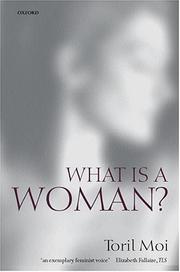| Listing 1 - 3 of 3 |
Sort by
|

ISBN: 0198186754 9780198186755 Year: 2008 Publisher: Oxford Oxford University Press
Abstract | Keywords | Export | Availability | Bookmark
 Loading...
Loading...Choose an application
- Reference Manager
- EndNote
- RefWorks (Direct export to RefWorks)
What is a woman? And what does it mean to be a feminist today? In her first full-scale engagement with feminist theory since her internationally renowned Sexual/Textual Politics (1985), Toril Moi challenges the dominant trends in contemporary feminist and cultural thought, arguing for a feminism of freedom inspired by Simone de Beauvoir's The Second Sex. Written in a clear and engaging style What is a Woman? brings together two brand new book-length theoretical interventions, Moi's work on Freud and Bourdieu, and her studies of desire and knowledge in literature. In the controversial title-essay, Toril Moi radically rethinks current debates about sex, gender, and the body - challenging the commonly held belief that the sex/gender distinction is fundamental to all feminist theory. Moi rejects every attempt to define masculinity and femininity, including efforts to define femininity as that which 'cannot be defined'. In the second new book-length essay, 'I Am a Woman', Toril Moi reworks the relationship between the personal and the philosophical, pursuing ways to write theory that do not neglect the claims of the personal. Setting up an encounter between contemporary theory and Simone de Beauvoir, Moi radically rethinks the need, and difficulty, of finding one's own philosophical voice by placing it in new theoretical contexts. A sustained refusal to lay down theoretical or political requirements for femininity, and a powerful argument for a feminism of freedom, What is a Woman? is a deeply original contribution to feminist theory.
82:396 --- 396 --- 82:396 Literatuur en feminisme --- Literatuur en feminisme --- Feminisme. Vrouwenbeweging. Vrouw en maatschappij --- Feminist theory --- Women and literature --- Feminism and literature --- Political philosophy. Social philosophy --- Philosophical anthropology --- Depth psychology --- Sociology of the family. Sociology of sexuality --- Human physiology --- Sociology of literature --- Bourdieu, Pierre --- Girard, René --- Freud, Sigmund
Book
ISBN: 0199202591 9780199202591 Year: 2008 Publisher: Oxford: Oxford university press,
Abstract | Keywords | Export | Availability | Bookmark
 Loading...
Loading...Choose an application
- Reference Manager
- EndNote
- RefWorks (Direct export to RefWorks)
Henrik Ibsen (1828-1906) is the founder of modern theater, and his plays are performed all over the world. Yet in spite of his unquestioned status as a classic of the stage, Ibsen is often dismissed as a fuddy-duddy old realist, whose plays are of interest only because they remain the gateway to modern theater. In Henrik Ibsen and the Birth of Modernism , Toril Moi makes a powerful case not just for Ibsen's modernity, but for his modernism. Situating Ibsen in his cultural context, she shows how unexpected his rise to world fame was, and the extent of his influence on writers such Shaw, Wilde, and Joyce who were seeking to escape the shackles of Victorianism. Henrik Ibsen and the Birth of Modernism also rewrites nineteenth-century literary history; positioning Ibsen between visual art and philosophy, the book offers a critique of traditional theories of the opposition between realism and modernism. Modernism, Moi argues, arose from the ruins of idealism, the dominant aesthetic paradigm of the nineteenth century. She also shows why Ibsen still matters to us today, by focusing on two major themes-his explorations of women, men, and marriage and his clear-eyed chronicling of the tension between skepticism and the everyday. This radical new account places Ibsen in his rightful place alongside Baudelaire, Flaubert, and Manet as a founder of European modernism.
Book
Year: 2008 Publisher: Oxford Oxford University Press
Abstract | Keywords | Export | Availability | Bookmark
 Loading...
Loading...Choose an application
- Reference Manager
- EndNote
- RefWorks (Direct export to RefWorks)
Philosophy --- Sociology of the family. Sociology of sexuality --- Thematology --- Feminism --- Writers --- Biography --- Book --- Beauvoir, de, Simone --- anno 1900-1999 --- France
| Listing 1 - 3 of 3 |
Sort by
|

 Search
Search Feedback
Feedback About UniCat
About UniCat  Help
Help News
News